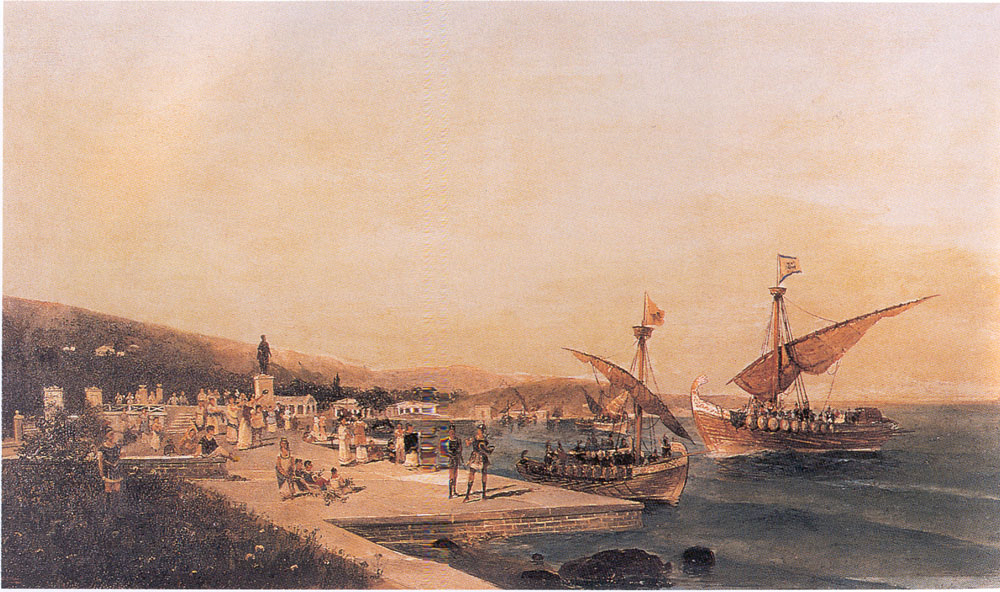|
University Of Thessaly
The University of Thessaly (UTH; Greek: ) is a public university in Thessaly, Greece, founded in 1984. The university includes the main campus in the city of Volos and regional campuses located in Karditsa, Larissa, Trikala, and the city of Lamia. The university's central administrative and academic building, located on the seaport seafront, it is often referred to as the main campus, but actually the university does not have a single main site, as it has multi sites with buildings being geographically distributed within the wider region of Volos across the city districts. Enrollment for Fall 2014 consisted of 14,000 undergraduates students, 2,150 master's degree-level students, 1,400 doctoral students, and 710 faculty members. Emblem The emblem of the University of Thessaly is Chiron, who used to live in Pelion Mountain and was famous for his special knowledge about medicine, music, archery, hunting, gymnastics and the art of prophecy. History Most university departments we ... [...More Info...] [...Related Items...] OR: [Wikipedia] [Google] [Baidu] |
Volos
Volos ( el, Βόλος ) is a coastal port city in Thessaly situated midway on the Greek mainland, about north of Athens and south of Thessaloniki. It is the sixth most populous city of Greece, and the capital of the Magnesia regional unit of the Thessaly Region. Volos is also the only outlet to the sea from Thessaly, the country's largest agricultural region. With a population of 144,449 (2011), the city is an important industrial centre, and its port provides a bridge between Europe and Asia. Volos is the newest of the Greek port cities, with a large proportion of modern buildings erected following catastrophic earthquakes in 1955. It includes the municipal units of Volos, Nea Ionia and Iolkos, as well as smaller suburban communities. The economy of the city is based on manufacturing, trade, services and tourism. Home to the University of Thessaly, the city also offers facilities for conferences, exhibitions and major sporting, cultural and scientific events. Volos parti ... [...More Info...] [...Related Items...] OR: [Wikipedia] [Google] [Baidu] |
Regional Development
Regional development is a broad term but can be seen as a general effort to reduce regional disparities by supporting (employ) economin regions. In the past, regional development policy tended to try to achieve these objectives by means development and by attracting inward investment (OECD,2020). A large number of international organizations such as the OECD, UN, IMF and many more that provide assistance on economic, environmental and social issues to the less economically developed regions. Regional development can be national or international in nature. Therefore, the implications and scope of regional development may vary according to the definition of a region and how the region and its boundaries are perceived internally and externally. By country Canada * Atlantic Canada Opportunities Agency * Economic Development Agency of Canada for the Regions of Quebec * Federal Economic Development Initiative for Northern Ontario * Western Economic Diversification Canada Malaysia * ... [...More Info...] [...Related Items...] OR: [Wikipedia] [Google] [Baidu] |
Planning
Planning is the process of thinking regarding the activities required to achieve a desired goal. Planning is based on foresight, the fundamental capacity for mental time travel. The evolution of forethought, the capacity to think ahead, is considered to have been a prime mover in human evolution. Planning is a fundamental property of intelligent behavior. It involves the use of logic and imagination to visualise not only a desired end result, but the steps necessary to achieve that result. An important aspect of planning is its relationship to forecasting. Forecasting aims to predict what the future will look like, while planning imagines what the future could look like. Planning according to established principles is a core part of many professional occupations, particularly in fields such as management and business. Once a plan has been developed it is possible to measure and assess progress, efficiency and effectiveness. As circumstances change, plans may need to be modified ... [...More Info...] [...Related Items...] OR: [Wikipedia] [Google] [Baidu] |
Mechanical Engineering
Mechanical engineering is the study of physical machines that may involve force and movement. It is an engineering branch that combines engineering physics and mathematics principles with materials science, to design, analyze, manufacture, and maintain mechanical systems. It is one of the oldest and broadest of the engineering branches. Mechanical engineering requires an understanding of core areas including mechanics, dynamics, thermodynamics, materials science, structural analysis, and electricity. In addition to these core principles, mechanical engineers use tools such as computer-aided design (CAD), computer-aided manufacturing (CAM), and product lifecycle management to design and analyze manufacturing plants, industrial equipment and machinery, heating and cooling systems, transport systems, aircraft, watercraft, robotics, medical devices, weapons, and others. Mechanical engineering emerged as a field during the Industrial Revolution in Europe in the 18th century; ... [...More Info...] [...Related Items...] OR: [Wikipedia] [Google] [Baidu] |
Civil Engineering
Civil engineering is a professional engineering discipline that deals with the design, construction, and maintenance of the physical and naturally built environment, including public works such as roads, bridges, canals, dams, airports, sewage systems, pipelines, structural components of buildings, and railways. Civil engineering is traditionally broken into a number of sub-disciplines. It is considered the second-oldest engineering discipline after military engineering, and it is defined to distinguish non-military engineering from military engineering. Civil engineering can take place in the public sector from municipal public works departments through to federal government agencies, and in the private sector from locally based firms to global Fortune 500 companies. History Civil engineering as a discipline Civil engineering is the application of physical and scientific principles for solving the problems of society, and its history is intricately linked to advances in t ... [...More Info...] [...Related Items...] OR: [Wikipedia] [Google] [Baidu] |
Architecture
Architecture is the art and technique of designing and building, as distinguished from the skills associated with construction. It is both the process and the product of sketching, conceiving, planning, designing, and constructing buildings or other structures. The term comes ; ; . Architectural works, in the material form of buildings, are often perceived as cultural symbols and as works of art. Historical civilizations are often identified with their surviving architectural achievements. The practice, which began in the prehistoric era, has been used as a way of expressing culture for civilizations on all seven continents. For this reason, architecture is considered to be a form of art. Texts on architecture have been written since ancient times. The earliest surviving text on architectural theories is the 1st century AD treatise '' De architectura'' by the Roman architect Vitruvius, according to whom a good building embodies , and (durability, utility, and beauty). ... [...More Info...] [...Related Items...] OR: [Wikipedia] [Google] [Baidu] |
Polytechnic (Greece)
The Polytechnic ( Greek: Πολυτεχνείο) is the traditional name for institutions of higher education in Greece, dealing with engineering at the undergraduate and postgraduate levels. There are currently two polytechnics that operate as independent (public) universities and five polytechnic schools that belong to universities. They consist mainly of Engineering departments and their undergraduate programs have a duration of 5 years (full-time). The legal framework of their operation is the same as the one of the universities, and their graduates have equal rights with the graduates of public Greek universities. Greek polytechnics are also referred to as ''Technical Universities''. Polytechnics in Greece National Technical University of Athens * School of Architectural Engineering * School of Applied Mathematical and Physical Sciences * School of Chemical Engineering * School of Civil Engineering * School of Electrical and Computer Engineering * School of Mechanical Eng ... [...More Info...] [...Related Items...] OR: [Wikipedia] [Google] [Baidu] |
Ichthyology
Ichthyology is the branch of zoology devoted to the study of fish, including bony fish ( Osteichthyes), cartilaginous fish (Chondrichthyes), and jawless fish (Agnatha). According to FishBase, 33,400 species of fish had been described as of October 2016, with approximately 250 new species described each year. Etymology The word is derived from the Greek words ἰχθύς, ''ikhthus'', meaning "fish"; and λογία, ''logia'', meaning "to study". History The study of fish dates from the Upper Paleolithic Revolution (with the advent of "high culture"). The science of ichthyology was developed in several interconnecting epochs, each with various significant advancements. The study of fish receives its origins from humans' desire to feed, clothe, and equip themselves with useful implements. According to Michael Barton, a prominent ichthyologist and professor at Centre College, "the earliest ichthyologists were ''hunters and gatherers'' who had learned how to obtain the most use ... [...More Info...] [...Related Items...] OR: [Wikipedia] [Google] [Baidu] |
Agriculture
Agriculture or farming is the practice of cultivating plants and livestock. Agriculture was the key development in the rise of sedentary human civilization, whereby farming of domesticated species created food surpluses that enabled people to live in cities. The history of agriculture began thousands of years ago. After gathering wild grains beginning at least 105,000 years ago, nascent farmers began to plant them around 11,500 years ago. Sheep, goats, pigs and cattle were domesticated over 10,000 years ago. Plants were independently cultivated in at least 11 regions of the world. Industrial agriculture based on large-scale monoculture in the twentieth century came to dominate agricultural output, though about 2 billion people still depended on subsistence agriculture. The major agricultural products can be broadly grouped into foods, fibers, fuels, and raw materials (such as rubber). Food classes include cereals (grains), vegetables, fruits, cooking oils, meat, milk, ... [...More Info...] [...Related Items...] OR: [Wikipedia] [Google] [Baidu] |
University Of Thessaly In The City Of Lamia
The Technological Educational Institute (TEI) of Central Greece (Greek: ) was a university founded in 2013, had a main campus in the City of Lamia, Phthiotis, Central Greece, and four branch campuses. An institution of higher education of the State University System of Greece, having full self governance and functions under the supervision of the Ministry of Education, laws 2916 on 11-6-2001 and 3549 on 20-3-2007. The Technological Institute of Central Greece has abolished on 29 January 2019 and ceased to be a university in its own name status by an Act of Hellenic Parliament, Law 4589/29-1-2019. Educational departments absorbed by the Agricultural University of Athens (AUA), National and Kapodistrian University of Athens (NKUA), University of Thessaly (UTH). It offered 4-year (full-time) undergraduate degree programs with awarded qualification (latinised: Ptychion), in line with the Bologna process legally equivalent to a Bachelor's degree, and 1½ years, one-and-a-ha ... [...More Info...] [...Related Items...] OR: [Wikipedia] [Google] [Baidu] |
Technological Educational Institute Of Central Greece
The Technological Educational Institute (TEI) of Central Greece (Greek: ) was a university founded in 2013, had a main campus in the City of Lamia, Phthiotis, Central Greece, and four branch campuses. An institution of higher education of the State University System of Greece, having full self governance and functions under the supervision of the Ministry of Education, laws 2916 on 11-6-2001 and 3549 on 20-3-2007. The Technological Institute of Central Greece has abolished on 29 January 2019 and ceased to be a university in its own name status by an Act of Hellenic Parliament, Law 4589/29-1-2019. Educational departments absorbed by the Agricultural University of Athens (AUA), National and Kapodistrian University of Athens (NKUA), University of Thessaly (UTH). It offered 4-year (full-time) undergraduate degree programs with awarded qualification (latinised: Ptychion), in line with the Bologna process legally equivalent to a Bachelor's degree, and 1½ years, one-and-a-ha ... [...More Info...] [...Related Items...] OR: [Wikipedia] [Google] [Baidu] |







